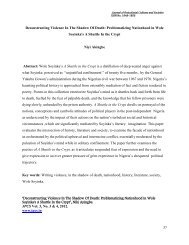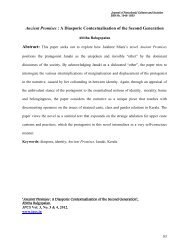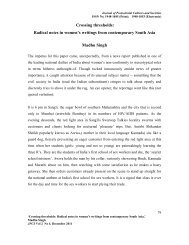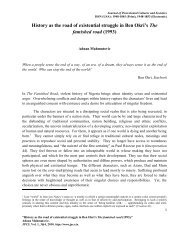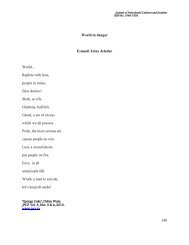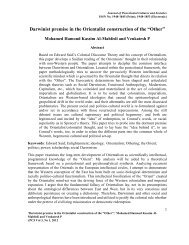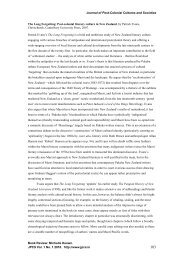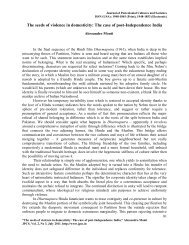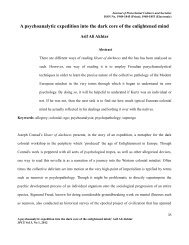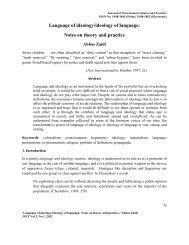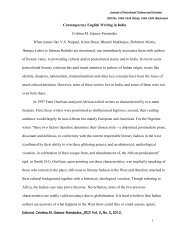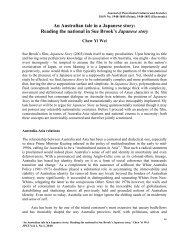Postcolonial literature in Africa: When Africans began to tell ... - JPCS
Postcolonial literature in Africa: When Africans began to tell ... - JPCS
Postcolonial literature in Africa: When Africans began to tell ... - JPCS
Create successful ePaper yourself
Turn your PDF publications into a flip-book with our unique Google optimized e-Paper software.
Journal of <strong>Postcolonial</strong> Cultures and SocietiesISSN (USA): 1948-1845 (Pr<strong>in</strong>t), 1948-1853 (Electronic)S<strong>in</strong>ce the collapse of colonialism all over the Cont<strong>in</strong>ent, <strong>Africa</strong>n authors have taken itupon themselves <strong>to</strong> <strong>tell</strong> their own s<strong>to</strong>ries <strong>in</strong> a more realistic and constructive manner. For fivedecades now, varieties of <strong>Africa</strong>n novels have been published which show what <strong>Africa</strong>ns are,their identities, their socio-economic challenges and their political resolves <strong>to</strong> pragmaticallyhandle all their problems. Two of these ground-break<strong>in</strong>g <strong>Africa</strong>n novels Arrow of God (1964)and A Gra<strong>in</strong> of Wheat (1967) are comprehensively discussed <strong>in</strong> this paper as representatives ofwhat <strong>Africa</strong>ns stand for, and what they are not.In Arrow of God, Ch<strong>in</strong>ua Achebe shows how gregarious <strong>Africa</strong>ns are as they formedlarge and protective communities compris<strong>in</strong>g of their extended relations: “Then Edogo livedthere alone until he married two years ago and built a small compound of his own beside hisfather‟s” (Achebe 10). This reveals the level of communal composition among <strong>Africa</strong>ns as theyshare spaces with their loved ones. They are not unruly pack of hooligans or crude beasts tha<strong>to</strong>ther non-<strong>Africa</strong>n <strong>literature</strong> may have wanted the entire world <strong>to</strong> believe. <strong>Africa</strong>ns pay seriousattention <strong>to</strong> organization, communal unity and <strong>in</strong>tegrity. They derive psychological embolden<strong>in</strong>gby liv<strong>in</strong>g next-door <strong>to</strong> their parents and sibl<strong>in</strong>gs. They even offer some measure of security andprotection for one another by do<strong>in</strong>g so.Ch<strong>in</strong>ua Achebe shows further <strong>in</strong> Arrow of God that <strong>Africa</strong>ns are religious, and they oftencommit their dest<strong>in</strong>y <strong>in</strong><strong>to</strong> the hands of their God (s):Th<strong>in</strong>gs were so bad for six villages that their leaders came <strong>to</strong>gether<strong>to</strong> save themselves. They hired a strong team of medic<strong>in</strong>e-men <strong>to</strong> <strong>in</strong>stall acommon deity for them. This deity which the fathers of the six villagesmade was called Ulu. (Achebe 15).Some measure of comportment and personal ability <strong>to</strong> address one’s domestic problem isrevealed <strong>in</strong> the quotation above. In other words, <strong>Africa</strong>n <strong>literature</strong> debunks the caricature of<strong>Africa</strong>ns as daft and <strong>in</strong>capable of mak<strong>in</strong>g strategic decisions about their own safety and future.Achebe also exposed the fact that <strong>Africa</strong>ns are not <strong>in</strong>ured from be<strong>in</strong>g corrupt and crafty as <strong>in</strong> thequotation below about a colonial official and an <strong>Africa</strong>n:Chief Ikedi was of course a very clever man and when Capta<strong>in</strong>W<strong>in</strong>terbot<strong>to</strong>m <strong>began</strong> <strong>to</strong> <strong>in</strong>vestigate this second scandal it was quiteimpossible <strong>to</strong> <strong>in</strong>crim<strong>in</strong>ate him; he had covered up his tracks sowell…there was no doubt <strong>in</strong> the m<strong>in</strong>d of Capta<strong>in</strong> W<strong>in</strong>terbot<strong>to</strong>m that chiefIkedi was still corrupt and high-handed only cleverer this time. (Achebe58)As the popular say<strong>in</strong>g goes, <strong>to</strong> err is human <strong>to</strong> forgive div<strong>in</strong>e. <strong>Africa</strong>ns are not perfectbe<strong>in</strong>gs that cannot commit similar mistakes that every other human be<strong>in</strong>g can <strong>in</strong>tentionally orun<strong>in</strong>tentionally commit. This is the essence of humanity, and that there are ample opportunitiesfor them <strong>to</strong> transform themselves <strong>in</strong><strong>to</strong> better and law-abid<strong>in</strong>g citizens of any place they may havefound themselves.“<strong>Postcolonial</strong> <strong>literature</strong> <strong>in</strong> <strong>Africa</strong>: <strong>When</strong> <strong>Africa</strong>ns <strong>began</strong> <strong>to</strong> <strong>tell</strong> their own s<strong>to</strong>ries,” Jerry Tunde Olasak<strong>in</strong>ju<strong>JPCS</strong>, Vol. 2, No 3, July 2011. http://www.jpcs.<strong>in</strong>15
Journal of <strong>Postcolonial</strong> Cultures and SocietiesISSN (USA): 1948-1845 (Pr<strong>in</strong>t), 1948-1853 (Electronic)Ngugi wa Thiongo’s novel A Gra<strong>in</strong> of Wheat also sheds more light on the character of<strong>Africa</strong>ns, <strong>to</strong>uch<strong>in</strong>g some areas that are essential for the cont<strong>in</strong>uation of <strong>Africa</strong>n identity. Hewrites:God helps those who help themselves, it is said, with f<strong>in</strong>gerspo<strong>in</strong>t<strong>in</strong>g at self-made man who has atta<strong>in</strong>ed wealth and position,forgett<strong>in</strong>g that thousands of others labour and starve, day <strong>in</strong>, day out,without ever improv<strong>in</strong>g their lot. This moral so readily adm<strong>in</strong>istered,seemed true for Gikonyo. People <strong>in</strong> Thabai said: Detention camps havetaught him <strong>to</strong> rule himself (Ngugi wa Thiongo 57).The quotation above describes a scenario where an <strong>Africa</strong>n has amassed stupendouswealth while others wallowed <strong>in</strong> abject poverty daily <strong>to</strong> f<strong>in</strong>d sustenance for themselves and theirfamilies. Here, we see the picture of unequal wealth distribution as prevalent <strong>in</strong> othercommunities of the world. Gikonyo, a man who had seen many <strong>in</strong>carcerations, is said <strong>to</strong> haveatta<strong>in</strong>ed a certa<strong>in</strong> level of self-determ<strong>in</strong>ation ow<strong>in</strong>g <strong>to</strong> his many trials and tribulations. But<strong>in</strong>stead of be<strong>in</strong>g disconcerted by his sad experiences, Gikonyo utilized the unique opportunity <strong>to</strong>transform himself. All the descriptions given <strong>in</strong> the forego<strong>in</strong>g confirm that <strong>Africa</strong>ns are a bunchof creative, humanistic and realistic people—they go through the ups and downs that mostpeople <strong>in</strong> other cultures go through. They work hard <strong>to</strong> motivate their people <strong>to</strong> act withimpunity and contribute their best <strong>in</strong> develop<strong>in</strong>g their ever-expand<strong>in</strong>g societies.Both Arrow of God and A Gra<strong>in</strong> of Wheat were selected as texts for this paper simplybecause they represented the feel<strong>in</strong>gs, activities, and behaviors of people who had lived dur<strong>in</strong>gthe colonial era. They show the sides of <strong>Africa</strong>ns that were neglected or subverted by plethora ofnon-<strong>Africa</strong>n <strong>literature</strong>. They revealed the real <strong>Africa</strong>ns the way they were <strong>in</strong> those days withoutany embellishments or subtraction.It must be stated that modern-day readers of these two novels may feel the need <strong>to</strong> justifythe observations that <strong>Africa</strong>ns dur<strong>in</strong>g the colonial era were simple, non-technologicallydeveloped and depend ma<strong>in</strong>ly on community unity <strong>to</strong> keep go<strong>in</strong>g. This is true <strong>to</strong> some extent;however, this paper only attempts <strong>to</strong> show that simple <strong>Africa</strong>n conclaves have strong communitysense that produces the much-required unity. <strong>Africa</strong>ns pay serious attention <strong>to</strong> leadership asshown <strong>in</strong> the quoted passages above, and they designed their own modalities for handl<strong>in</strong>gdomestic and <strong>in</strong>ter-tribal problems. This observation <strong>in</strong> itself supports the fact that <strong>Africa</strong>ncommunities are complex, not simple; and they are <strong>in</strong>tricately designed that every member of acommunity understand his or her responsibility <strong>in</strong> mak<strong>in</strong>g the entire <strong>in</strong>habitants of thatcommunities <strong>to</strong> live <strong>in</strong> peace <strong>to</strong>gether.As a matter of fact, this paper attempts <strong>to</strong> <strong>in</strong>vite readers <strong>to</strong> see <strong>Africa</strong>ns that were notproperly represented <strong>in</strong> non-<strong>Africa</strong>n <strong>literature</strong> then. It serves <strong>to</strong> create awareness that <strong>Africa</strong>, likeevery other cont<strong>in</strong>ent, passes through phases of civilizations and developments. The modern-day<strong>Africa</strong>ns may have adopted new and various different lifestyles unlike their forebears, but itstands <strong>to</strong> prove that <strong>Africa</strong>ns are a people with rich his<strong>to</strong>ry, culture and language. <strong>Africa</strong>ns arenot savages or dullards, but possess human souls that are capable of self-regeneration through theapplication of the appropriate knowledge, <strong>in</strong>formation and education. To see a group the waythey are should be regarded as the beauty of <strong>literature</strong>.“<strong>Postcolonial</strong> <strong>literature</strong> <strong>in</strong> <strong>Africa</strong>: <strong>When</strong> <strong>Africa</strong>ns <strong>began</strong> <strong>to</strong> <strong>tell</strong> their own s<strong>to</strong>ries,” Jerry Tunde Olasak<strong>in</strong>ju<strong>JPCS</strong>, Vol. 2, No 3, July 2011. http://www.jpcs.<strong>in</strong>16
Journal of <strong>Postcolonial</strong> Cultures and SocietiesISSN (USA): 1948-1845 (Pr<strong>in</strong>t), 1948-1853 (Electronic)__________BiographyJerry Tunde Olasak<strong>in</strong>ju is an experienced ESL/English Instruc<strong>to</strong>r certified by AnaheimUniversity, Anaheim, CA (USA). He has taught English extensively <strong>in</strong> <strong>Africa</strong> and Asia. Hecurrently lives <strong>in</strong> Japan where he works as an ESL Instruc<strong>to</strong>r. And he is also study<strong>in</strong>g for hisMFA (<strong>in</strong> Creative Writ<strong>in</strong>g) at National University, La Jolla, CA (USA).Work citedAchebe, Ch<strong>in</strong>ua. Arrow of God. London: He<strong>in</strong>emann, 1986 (1964).Conrad, Joseph. Heart of Darkness and The Secret Sharer. New York: New American Library, 1950.Hergé. T<strong>in</strong>t<strong>in</strong> <strong>in</strong> the Congo. New York: French and European Publications, 1987 (Petit V<strong>in</strong>gtième: 1930-1931; Casterman: 1937 & 1942; Colour pr<strong>in</strong>t: 1946).Allaby, Michael. Dictionary of Plant Sciences. Oxford: Oxford University Press, 2006.Ngugi wa Thiong’o. A Gra<strong>in</strong> of Wheat. London: He<strong>in</strong>neman, 1986 (1967).“<strong>Postcolonial</strong> <strong>literature</strong> <strong>in</strong> <strong>Africa</strong>: <strong>When</strong> <strong>Africa</strong>ns <strong>began</strong> <strong>to</strong> <strong>tell</strong> their own s<strong>to</strong>ries,” Jerry Tunde Olasak<strong>in</strong>ju<strong>JPCS</strong>, Vol. 2, No 3, July 2011. http://www.jpcs.<strong>in</strong>17



